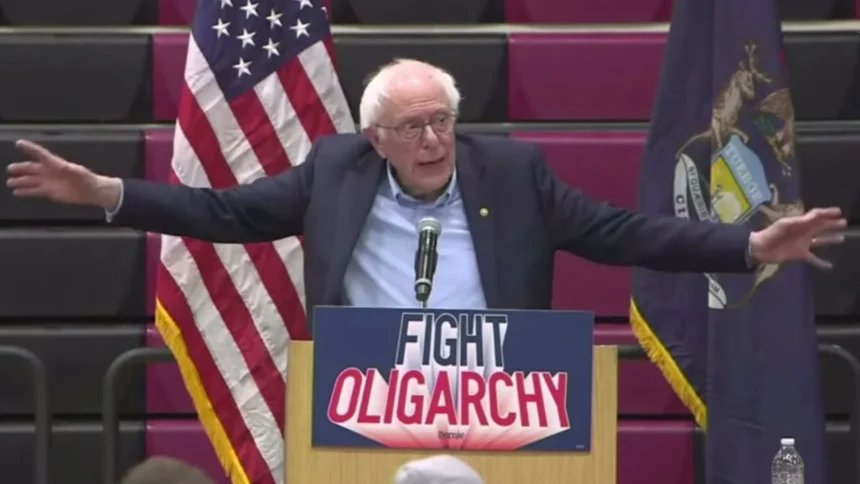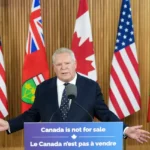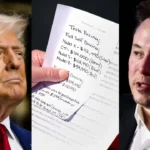More than 10,000 people packed Lincoln High School’s gym in Warren, Michigan, for one reason—to hear Bernie Sanders speak. The overflow crowd spilled into hallways and outdoor spaces, a testament to the growing energy behind his “Fighting Oligarchy” tour.
The sheer size of the turnout sent a clear message: the progressive movement is alive, mobilized, and ready to take on the billionaire class.
Wayne County Health Director Abdul El-Sayed, a potential 2026 U.S. Senate candidate, fired up the audience before Sanders took the stage.
“They want us to step back,” he declared. “But today, all of you have said we are stepping forward. We have everything we need to build a government for the people.”
Sanders didn’t just deliver a speech—he issued a battle cry. He compared this moment in history to the American Revolution and the fight against slavery, emphasizing that real change only happens when ordinary people stand up against oppression.
“The stakes couldn’t be higher,” he told the roaring crowd. “We’re not just fighting corruption. We’re fighting the Big Lie—a parallel universe designed to manipulate, mislead, and divide.”
Sanders made it clear: America is at a crossroads. One path leads to a government controlled by billionaires like Elon Musk and Jeff Bezos. The other leads to a government that serves the working class. The choice, he said, belongs to the people.
Sanders isn’t just rallying supporters in progressive strongholds. His tour is laser-focused on Republican-held swing districts, where shifting a few thousand votes could flip congressional seats.
He called out Rep. John James (R-Mich.), challenging him to hold an in-person town hall and face the voters directly.
“He has the right to speak,” Sanders said, “but you have the right to ask him tough questions. That’s democracy.”
His direct challenge underscored a broader theme: accountability. Sanders is pushing for a government that listens to the people, not just the ultra-rich.
United Auto Workers (UAW) President Shawn Fain took the stage wearing an “Eat the Rich” T-shirt, fueling the crowd’s energy. His message was blunt: “Billionaires don’t have a right to exist while millions struggle to survive.”
El-Sayed followed with an attack on the Trump administration’s policies, warning, “They want to move fast and break things—but what they’re breaking is our government, funded by our tax dollars.”
The speeches weren’t just political rhetoric. They were calls for a working-class rebellion against corporate greed and government corruption.
Warren wasn’t an isolated event. In Kenosha, Wisconsin, Sanders drew 4,000 people. In tiny Altoona, Wisconsin, 2,600 supporters showed up—staggering numbers for such a small town.
The movement is gaining traction, and with every stop, the question looms larger: Is Sanders preparing for another run?
He insists this isn’t about a campaign. “The country’s in trouble,” he told reporters. “I want to play my role.” But with enthusiasm reaching fever pitch, speculation about a 2028 bid is impossible to ignore.
Not everyone in the Democratic Party is moving at Sanders’ pace. Progressive leaders like Rep. Alexandria Ocasio-Cortez have praised his activism. “Who else is doing this?” she asked. “No one.”
Grassroots organizations like Indivisible are also rallying behind him, organizing protests and pressuring Republican lawmakers.
“I wish more Democrats were traveling the country rallying the majority against Musk and Project 2025,” said Indivisible co-founder Ezra Levin.
But establishment Democrats have taken a more traditional approach. House Minority Leader Hakeem Jeffries, for example, has focused on a book tour rather than direct grassroots engagement—drawing criticism from those who believe the moment demands bold action.
Sanders’ tour is more than a series of speeches; it’s a movement-building effort designed to reshape the political landscape. Whether or not he runs for office again, his influence is undeniable.
By focusing on swing districts and galvanizing working-class voters, he is setting the stage for a progressive resurgence in the 2026 midterms—and beyond.
Clark is a 26-year-old expert working for consumer protection, Clark has dedicated years to identifying and exposing fraudulent schemes. He is working with NGOs to help people who are victims of scams. In his free time, Todd plays football or goes to a bar.







